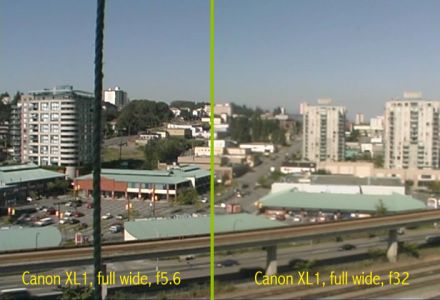The XL1 Watchdog
|
> top of page < |
Soft Focus Problem & Workaround
as told to Chris Hurd by Joe Bogacz
I had learned a lot during my lengthy visit with Joe Bogacz at NAB '98, but he wasn't through with me yet. "Now, would you like to know what's going on with the soft-focus complaints you've been hearing about?" My paper was filling up fast.
"It's all a matter of user settings," Joe assured me. "The XL1 is a camera which, unlike others in its class, is easily capable of reaching an iris setting of f/32 automatically when shooting in bright conditions in full auto mode. That's a very small hole for light to travel through, and when light travels through small holes sometimes you get a well-known optical effect called diffraction." As he cued the videotape to show me an example, my mind went back to my high school days when I was very interested in astronomy and amateur telescope making, and, therefore, optics.
"Diffraction, that's when light rays diverge away from themselves," I remembered. "That's right," Joe said, "and these slightly diverging rays can be commonly mistaken for soft focus in the lens." On the monitor was a scene Joe had shot with an XL1 of a tall apartment building near Central Park in New York. The display settings were also recorded and the f-stop was indeed f/32. When he went all the way in on the zoom, the detail was so good that I could see heat waves rippling from the building... but the building's edges weren't sharply defined. Instead they were fuzzy. Lots of detail, but fuzzy. "That's what diffraction in a small iris opening will do to your shot," Joe said. "But watch this."
I looked at the tape as Joe's camera settings (which I'll get into in a second) were changed and the building's edges became sharp. It was quite a difference. Diffraction is part of the way optics work... it's physics. But the XL1, which gives you the small f/32 iris that produces this effect, also gives you the manual settings capability to get away from it. "The easiest work-around is to keep the f/stop larger, like f/16 or f/8," Joe said. "The sweet spot of the lens where light behaves like it's supposed to is about f/f5.6 for most cameras anyway."
But if you have to shoot at greater than f/16 and your image looks fuzzy due to diffraction, you can take corrective measures. In the following order of priority, first, add the Neutral Density filter. Then, if you need to, turn down the gain (it goes down to -3db). After that, if required, increase the shutter speed -- and you've got a lot of increments there you can work with.
Recently, Watchdog reader Sean Molloy of Blue Frog Productions in Vancouver, BC contributed this still image, an XL1 frame-grab which clearly shows the diffraction effect possible at small iris settings. The focal length of the lens is at the full-wide zoom setting. Click on the image to get the "actual size" 720x480 version, then use the "back" button on your browser to return to this page.

Joe Bogacz had given me an abundance of information to pass along to Watchdog readers. I asked if there was anything else in particular he wanted to address for XL1 owners and buyer-to-be.
"The most important thing to understand about the XL1 is Canon's commitment," he said. "If you think you have a problem with the camera, contact us immediately. The internet is a great way to share information, but it won't fix your XL1. We look at the web and read the newsgroups, and the number of complaints on the internet far outweigh the number we're actually getting at Canon. We can't respond unless a user calls us directly, and we answer everyone. That's our policy. So I would ask that if you have a concern about the XL1, make sure you let us know about it."
Back to the XL1 Articles Menu
Thrown together by Chris Hurd
Please direct questions to the DV Info Net Community Forums.
Where to Buy: These dealers are authorized DV Info Net sponsors... | |||
|
|
|
|
|
|
|
|
Please support this site by making your purchases through them. Thanks! | |||
©1998-2008 DV Info Net
The Digital Video Information Network
San Marcos, Texas
For success, attitude is equally as important as ability.